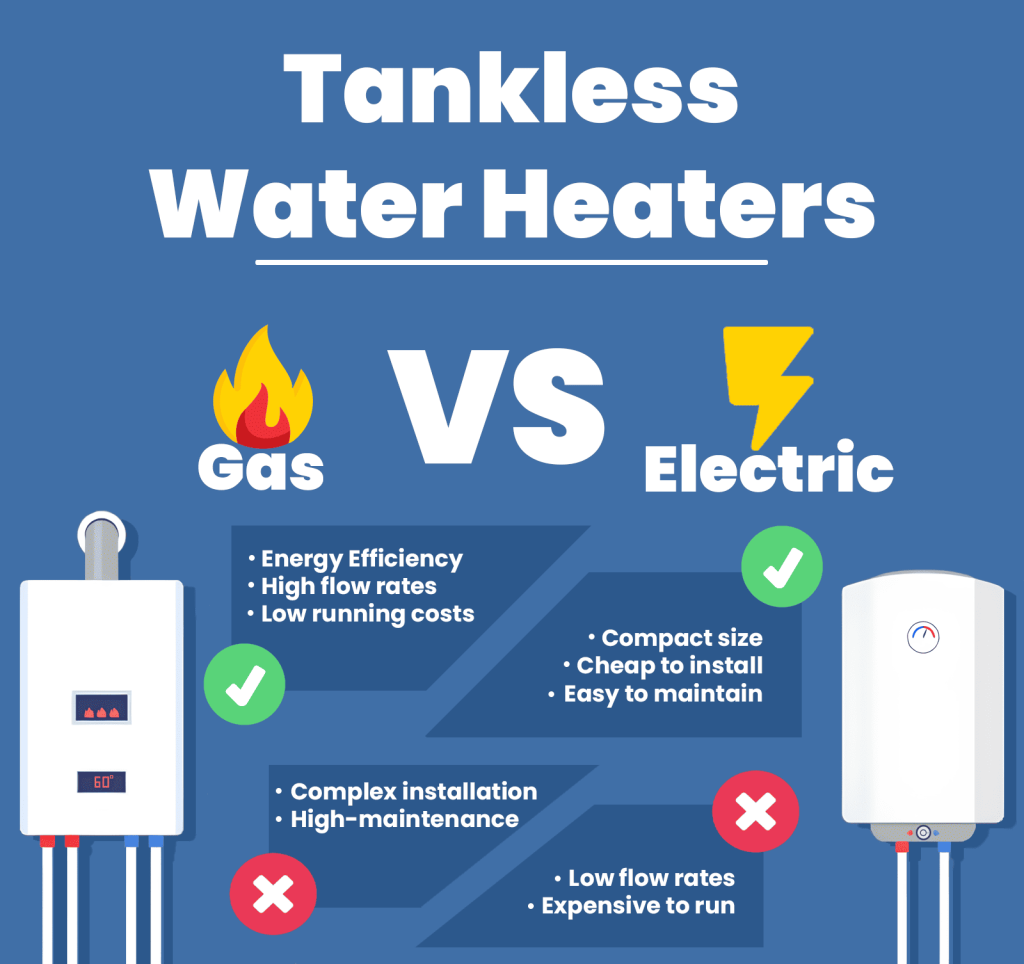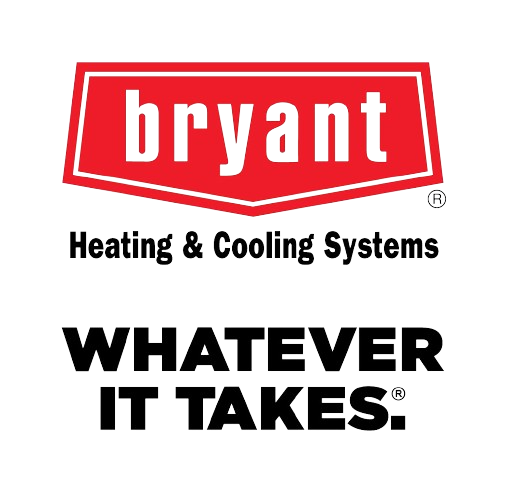Imagine never running out of hot water again while saving up to 34% on your energy bills.
With a lifespan of up to 20 years, electric and gas tankless water heater installations are smart, long-term investments. If you’re still wondering about the basics of water heater systems, or considering upgrading to a tankless model, this guide will help you understand why a tankless hot water heater might be the perfect next step for your home.
Content Table
What you need to know about tankless water heaters
Did you know 15% of your home’s energy usage comes from water heating? Here are some essential points about tankless heaters that could change how you think about hot water:
- Cost savings: Tankless heaters offer significant savings on energy bills, ranging from 8% to 34%, depending on how much water is used in your home. Also, they require almost no replacements, making them the most cost-effective choice.
- Energy efficiency: Tankless hot water heaters are significantly more energy-efficient because they heat water only when needed. Tank units always keep a large volume of water hot, leading to significant energy waste you don’t want in your bills.
- Longevity: These units typically last up to 20 years, compared to tank heaters’ 10-15 year lifespan. (Of course, good maintenance is key.)
Wondering how a tankless water heater works?
Tankless units operate on demand, heating water instantly as it flows through the unit. Here’s a closer look at how they function:
- Activation: When you turn on a hot tap, cold water (at around 50ºF, cold enough to keep you from wanting to shower) travels through a pipe into the tankless unit.
- Heating: A gas or electric burner heats the water as it passes through the heat exchanger.
- Continuous supply: The heated water is delivered directly to your tap without the need for storage. Tankless heaters can provide hot water at a rate of 2–5 gallons every minute, giving you an endless supply whenever you need it.
Gas or electric tankless water heater? Pros and cons
Deciding between a gas and electric tankless water heater installation can be tricky because it depends on several factors, like your hot water needs, the cost of fuel in your area, and installation considerations.
Here’s a breakdown of electric and gas tankless water heaters pros and cons:

Tankless gas water heater
Pros
- Efficiency: Newer tankless propane water heater models are super efficient, especially condensing ones that use more heat from the exhaust gases.
- Higher flow rates: Great for larger households, but keep in mind that sometimes, even the largest tankless gas water heater won’t be able to supply your whole home at the same time. Consider whether you need a separate heater for some of your appliances.
- Lower costs: Natural gas costs are usually lower than electricity in most states.
Cons
- Installation complexity: You might need to upgrade gas lines and ensure enough ventilation, which can be costly. Some gas tankless water heaters are eligible for a tax credit.
- Regular maintenance: A gas tankless water heater needs vent and gas line inspections to keep running efficiently.
Ideal for:
- Larger households
- Homes with existing gas lines
- Those looking for peak efficiency despite higher tankless gas water heater installation costs
Electric tankless water heater
Pros
- Compact size: Tankless electric water heaters are perfect for smaller spaces and can be installed closer to where hot water is needed.
- Lower installation costs: No need for ventilation, making them less costly and easier to install.
- Simplicity: Easier to maintain since they don’t need venting or gas line inspections.
Cons
- Lower flow rates: Not enough for large households with high hot water demand.
- Electricity costs: Tankless electric water heaters can be more expensive to operate in areas with high electricity rates.
Ideal for:
- Smaller households or point-of-use.
- Homes without gas lines or enough ventilation.
- Those looking for a simpler tankless water heater installation.
Let’s talk about tankless water heater maintenance
Keeping your unit in good shape for many years requires regular maintenance, whether a gas or electric tankless water heater. Here’s what you have to do to avoid common tankless water heater problems:
- Descale and flush regularly: Hard water can cause mineral buildup in your unit, reducing efficiency and potentially leading to great damage. You should do this at least once a year.
- Check supply: Maintaining the gas supply and electrical connections can help avoid ignition problems.
- Clean pipes: Cleaning and inspecting the exhaust pipes regularly can prevent blockages that increase the risk of malfunctions.
- Inspect for leaks: Periodically inspect the system for any leaks. Early detection and repair can prevent water damage.
- Upkeep filters: Check and clean the water line and air filters regularly to keep the system running smoothly, maintain a nice water flow, and efficiently heat the home.
While you can handle regular upkeep tasks, hiring a professional for thorough annual tankless water heater maintenance is a good idea. A pro can inspect the system, perform detailed cleaning, and catch any problems you might miss.
Things to consider to avoid having tankless water heater problems
Switching to a tankless water heater installation is a significant investment, so here are a few considerations to keep in mind:
- Initial cost: The upfront tankless water heater costs can be higher than those of tank models.
- Installation complexity: To accommodate a tankless unit, you may need to upgrade your home’s gas lines or electrical system.
- Right-sizing: Low hot water output can occur if the unit is undersized to meet your home’s needs. Ensure the chosen unit can handle your household’s peak hot water demand.
BONUS: How to save energy, water, and money at the same time!
- Don’t let the water run: Avoid letting water run while brushing your teeth, washing dishes, or doing other tasks. Simply turning off the tap can save a lot of water and energy over time.
- Install heat traps on your water heater tank: If you haven’t gone tankless, heat traps can save $15–$30 on your water heating bill. They prevent heat from escaping up the pipes.
- Take shorter showers: Reducing your shower time can save significant hot water. A short shower uses less water than a bath, and turning off the water while soaping up, shampooing, or shaving can lead to even more savings.
- Use cold water for laundry: Washing clothes in cold water can save energy and reduce utility bills (and avoid unexpected shrinking!). Most laundry loads don’t require hot water, and using cold water helps protect your clothes from wear and tear while saving energy.
Ready to make the switch?
If your water heater needs replacing, upgrade to a tankless heater today and enjoy endless hot water, energy savings, and peace of mind.
We’re happy to serve homes in the following areas:
Tankless Water Heater – FAQ
With proper maintenance, tankless hot water heaters can last up to 20 years, that’s between 5 and 10 years more than traditional units.
To choose the right size for your heater, you need to know two things: how much hot water you need at once (flow rate) and how much you need the water heated (temperature rise). This helps you find a heater that can meet your needs, whether it’s for your whole house or just a specific area like a bathroom.
Tankless water heater costs range from $500 to $2,300 on average. It will depend on whether it’s fueled by gas or electricity and if it’s for a single point or your whole house. Some tankless hot water heaters can be eligible for tax credits.
The main drawbacks are that initial tankless water heater costs are higher, and the installation is potentially more complex than that of a traditional unit.
This varies based on your peak demand, but, on average, tankless hot water heaters can provide hot water at a rate of 2–5 gallons per minute.
Yes, these units heat water only when you need it, so you can have savings in your energy bills ranging from 8% to 34%, depending on how much hot water is used in your home.
Usage varies, but tankless propane water heaters can save you about 33% on energy costs compared to traditional tank heaters. How much propane you use depends on how much hot water you draw. The best savings happen when you use around 50 gallons of hot water daily. Essentially, the more hot water you use at once, the more efficient the tankless propane water heater becomes, especially if you use over 10 gallons in a single go.
So, are tankless water heaters worth it?
Still asking yourself if a tankless water heater is worth it? With rising energy costs and a growing focus on sustainability, switching to a tankless unit is more relevant than ever.
It’s time to start reducing your energy bills and carbon footprint. Switch to a tankless heater for reliable, eco-friendly, and money-saving hot water.

